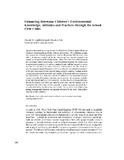Please use this identifier to cite or link to this item:
http://hdl.handle.net/10311/790Full metadata record
| DC Field | Value | Language |
|---|---|---|
| dc.contributor.author | Ajiboye, J.O. | - |
| dc.contributor.author | Silo, N. | - |
| dc.date.accessioned | 2011-04-14T13:59:35Z | - |
| dc.date.available | 2011-04-14T13:59:35Z | - |
| dc.date.issued | 2008-07 | - |
| dc.identifier.citation | Ajiboye, J.O. and Silo, N. (2008) Enhancing Botswana children’s environmental knowledge, attitudes and practices through the school civic clubs, International Journal of Environmental & Science Education, Vol. 3, No. 3, pp. 105-114. | en_US |
| dc.identifier.issn | 1117-3259 | - |
| dc.identifier.uri | http://hdl.handle.net/10311/790 | - |
| dc.description.abstract | An intervention study was set up through the School Civic Clubs to improve Botswana Children’s environmental knowledge, attitudes and practices. The underlying assump-tion in using this informal approach was based on the premise that the school time table is already overcrowded and that the infusion approach currently adopted in the country has not produced the desired results. Hence, the Civic Clubs were introduced into ten Primary schools in Botswana. Using this informal approach, the children were given requisite training in civic and environmental issues, and they engaged in various activities for a period of six weeks. Data was collected before and after the project activities using two hundred members of the civic clubs and two hundred non-members of the club. Data collected were analyzed using descriptive analyses. Findings indicate a significant change in the knowledge and attitudes of the pupils after their exposure to the club activities. Also, there was a significant difference in the knowledge of pupils exposed to the EE club activities and those not so exposed. The interaction of pupils’ gender and class of study were also examined. Teaching children environmental issues through the School Civic Clubs was explored in the study, and the findings seem to demonstrate the effectiveness of this approach as against the more theoretical class-room-based teaching currently going on in schools. The use of the Civic Clubs in promoting environmental education was therefore advocated by the study, both in Botswana and in other countries. | en_US |
| dc.language.iso | en | en_US |
| dc.publisher | IJESE, http://www.ijese.com | en_US |
| dc.subject | Civics clubs | en_US |
| dc.subject | Environmental education | en_US |
| dc.subject | Environmental knowledge and attitudes | en_US |
| dc.title | Enhancing Botswana children’s environmental knowledge, attitudes and practices through the school civic clubs | en_US |
| dc.type | Published Article | en_US |
| dc.rights.holder | IJESE | en_US |
| dc.link | http://www.ijese.com/V3_N3_Ajiboye.pdf | en_US |
| Appears in Collections: | Research articles (Dept of Primary Education) | |
Files in This Item:
| File | Description | Size | Format | |
|---|---|---|---|---|
| Ajiboye_IJESE_2008.pdf | 1.18 MB | Adobe PDF |  View/Open |
Items in DSpace are protected by copyright, with all rights reserved, unless otherwise indicated.
